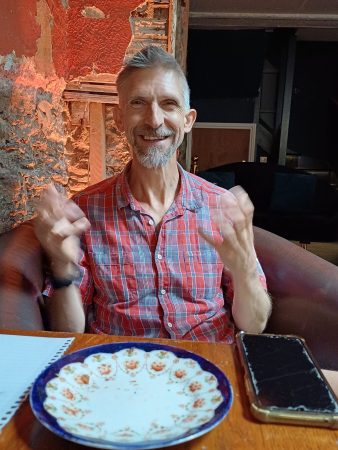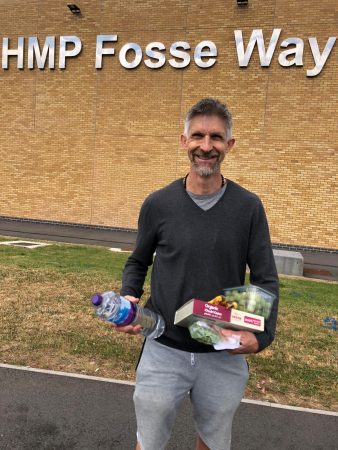Totnes Environmental Campaigner Freed from Prison
Larch Maxey, climate campaigner and long time Totnes resident has recently come out of prison and returned to Totnes. He had been found guilty of conspiracy to cause a public nuisance and sentenced to three years in prison. To his many friends and admirers he is a selfless hero. The state regarded him as a public nuisance who should be locked away.
Larch has talked to the Totnes Pulse about his experience in prison and what led up to it; how he became involved in protests and his hopes for the future.
 In April 2022 Larch, with five other Just Stop Oil protestors dug and occupied tunnels under the approach roads to the Navigator oil terminal in Thurrock, Essex. The aim of the protest was to draw public attention to the climate emergency and to demand that the government issued no new licenses for the extraction of coal, oil or gas.
In April 2022 Larch, with five other Just Stop Oil protestors dug and occupied tunnels under the approach roads to the Navigator oil terminal in Thurrock, Essex. The aim of the protest was to draw public attention to the climate emergency and to demand that the government issued no new licenses for the extraction of coal, oil or gas.
Doing Time
The protest was peaceful, but disrupted road tankers trying to access and leave the biggest oil terminal in Britain. After six days Larch was forcibly removed by the police and released without charge. Six months later Larch and his fellow protestors were charged with ‘conspiracy to cause a public nuisance’, a statutory offence under the new Police, Crime, Sentencing and Courts Act which became law in April 2022. This new offence no longer requires evidence that a public nuisance was caused. It is sufficient for the prosecution to show that it was planned.

Sentencing
Larch appeared in court in April 2024 and was found guilty. Finally, in September 2024, and in spite of the prison overcrowding crisis, Larch was sentenced to three years imprisonment. A sentence that many people consider was totally disproportionate.
Larch was released from prison last month under the early release scheme. He is required to wear an electronic tag and is supervised by the Probation Service. He is currently under a 7pm to 7am curfew. Larch could be recalled to prison if he commits any other offence, or breaches any of his numerous license conditions before September 2027.
This has been Larch’s first experience of a prison sentence, but he is not new to campaigning. In 2022 Larch was involved in a protest against HS2 which involved him and 8 others, including Daniel Hooper aka “Swampy” digging and occupying tunnels under Euston Square Gardens ,in London. Larch, who says he is claustrophobic, spent 28 days in a tunnel before being pulled out by the police. He and his fellow campaigners appeared in court charged with aggravated trespass, but were acquitted. HS2 sought a judicial review of the acquittal and a retrial was held. On that occasion Larch was given a three month prison sentence suspended for 12 months, so remained free.
Protesting
In 2018 Larch took a sabbatical from his job with Totnes-based charity the Network of Wellbeing to help set up Extinction Rebellion, which became world infamous for the iconic level of public disruption caused by its protest actions such as the Pink Boat occupying Oxford Circus.
Larch is well aware of the personal risks he has taken through his campaigning. He regrets the disruption and inconvenience he and others have caused to the public but his experience of protesting has taught him that anything other than direct action rarely gets results.
Larch’s awareness of the climate crisis grew from a school project on acid rain in 1985, when he was 13 years old. His parents were not politically active although his grandfather was involved in the trade union movement. He felt supported and empowered by his parents to pursue his interests. As a student he was involved in LAMB, a student-led campaign against Lloyds and Midland banks’ and their involvement in Majority World debt.
In 1993, as a postgraduate student, Larch organised for a group of students to attend an anti-fascist demonstration in London. The peaceful demonstration of 40,000 of all ages & walks of life was kettled by police and gained little media coverage which underplayed the numbers and focused on violence between police and a handful of protesters. It was a harrowing, frustrating experience for the students protestors.

The following day Larch and his student group attended a community barricading day in East London against the extension of the M11-Link. Local residents included 90 year old Dolly who was born in her home and refused the compulsory purchase money. Larch realised that if the numbers attending the march the previous day used these direct action tactics they could stop the road. This helped to convince Larch that direct action to raise public awareness is key to successful campaigning. Raising public awareness has been one of the guiding principles of Extinction Rebellion and Just Stop Oil.
Larch believes that both campaigns have been successful in spite of the adverse publicity they have received, in part because they’ve shifted the Overton Window, the political frame within which ideas are discussed. If an idea is within the window, it can be discussed and will be taken seriously. If it lies outside of it, a politician will be risking their career and credibility if they support it.
According to its originator, ideas move through a spectrum towards official acceptance. They start out unthinkable, and move to radical, acceptable, sensible, popular, and finally they get adopted as policy.
Emergency
Larch believes that Extinction Rebellion contributed to a shift of the Overton Window to the extent that there is now a far wider awareness that the Climate and Nature Emergency threatens human and other species’ extinction and the UK Parliament was the first national parliament in the world to declare a Climate and Nature Emergency with over 2300 jurisdictions and 40 nations now having made this declaration.
The HS2 campaign, which focussed on social, economic, ecological and environmental damage, as well as corruption led to a much wider discussion of the pros and cons of HS2. Several documentaries highlighted the problems and much of the project has been scaled back so that most of the proposed ecological damage has been prevented.
Just Stop Oil had similar success in shifting the public debate to the extent that the Labour Party adopted the policy to issue no new licences for coal, oil or gas extraction in 2022. A policy which has been implemened in government.
Is it all worth it?
None of this campaigning has been without personal cost. Larch is remarkable in both his resilience and positive outlook. Larch describes his experience in prison as terrifying, traumatic, as well as positive and empowering. He argues that prison serves to punish society’s victims. Larch refuses to see himself as a victim recognising the many privileges he has had in his life. Any frustration arising from his loss of liberty, Larch sees as insignificant compared to the frustration of inaction over climate and increasing denial of the problem.
The conditions of his licence prevent Larch from disruptive protest over the next three years, but he will be far from inactive. He’s looking forward to re-engaging with life in Totnes, where in the past he has been involved in the Network of Wellbeing, Incredible Edibles and community gardens. He also wants to write a book about why he’s done what he’s done.
What Next?
As far as campaigning is concerned Larch has shifted his focused away from disruptive action. Larch has no expectation that others will choose to campaign in ways that he has in the past. He recognises that most of the rights we take for granted, such as the right to the weekend, to fair pay and to vote, came through disruptive protest and that everyone is different and can find different ways of promoting change, however small. Larch believes that everyone is fundamentally good, but can only do what they can within their sphere of influence.
Larch sees the difficulty of achieving change as rooted in our political system where current democratic processes lead inevitably to corruption and the concentration of power in the hands of a small number of largely self-serving people. The alternative, Larch would argue for, is that we upgrade to deliberative democracy through sortition-based assemblies.
Changing the System
Instead of electing members of a political party where power rests with the party leadership, sortition allows numbers of randomly selected, but highly representative groups of ordinary people to form citizen assemblies, or mini publics, to develop policies on key issues based on the evidence, not corporate lobbying or cronyism. Sortition requires a process similar to jury selection with similar expectations of service and independent, tamper-proof deliberation.
 Some advocates of sortition, such as the Sortition Foundation, with its 858 project are calling for Citizens’ Assemblies or even the replacement of the House of Lords with a House of the People. Larch thinks a combined small scale, bottom-up as well as national top-down approach has most chance of success, particularly if initially used to supplement, rather than replace existing decision making. This is the approach of Assemble, (www.timetoassemble.org) which Larch volunteered with for his last few months of freedom before his prison sentence.
Some advocates of sortition, such as the Sortition Foundation, with its 858 project are calling for Citizens’ Assemblies or even the replacement of the House of Lords with a House of the People. Larch thinks a combined small scale, bottom-up as well as national top-down approach has most chance of success, particularly if initially used to supplement, rather than replace existing decision making. This is the approach of Assemble, (www.timetoassemble.org) which Larch volunteered with for his last few months of freedom before his prison sentence.
In Totnes last July Larch helped run a community assembly of 80 people and is keen to follow up on this now he’s back. Larch believes that we need to start taking these assemblies seriously and give them real teeth to shape policy. Larch can envision a future where Mini-publics which are small, representative groups of citizens are convened to deliberate on a specific issue and make policy recommendations. Maybe Totnes could once again lead the way in this.
Many people will be welcoming Larch back to Totnes. Others may say that he should still be in prison. Whatever your view of what he’s done, it feels that Totnes is fortunate to have regained a citizen so full of ideas and energy and concern for the future.


Welcome home Larch, thank you for all your actions and your insightful approach to prison. Wishing you a blessed soft landing back in the Shire 😊